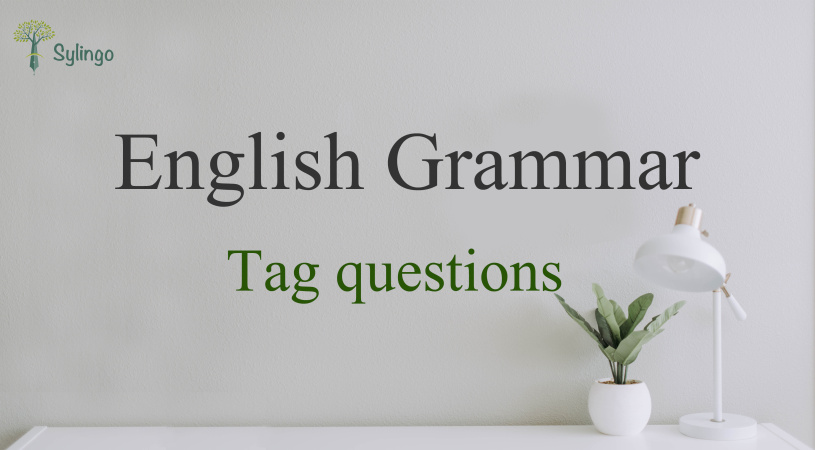Tag questions are a grammatical structure placed at the end of a sentence. In this lesson, we will learn about all forms of tag questions.
Tag questions properties
1- We place tag questions after the sentences, whether affirmative or negative, but they cannot be placed after the interrogative sentences.
2- There are two forms: the affirmative tag that comes after the negative statement and the negative tag that comes after the affirmative statement.
3- If a sentence includes an auxiliary verb or the main verb is (be), then we reuse the same auxiliary or the verb (be) in the tag question.
4- If a sentence does not include an auxiliary verb, we add the verb (do) in the correct tense.
Forming tag questions
We first need to know the tense used in the sentence and if it has an auxiliary. Also, we need to determine if the sentence is in the affirmative or negative form.
1- Verb (be)
- In affirmative sentences:
If a sentence has the verb (be) as the main verb or auxiliary in any tense, we put the verb (be) in the negative form, then we put the subject and a question mark.
Examples:
- You are a doctor, aren’t you?
- He is doing his homework, isn’t he?
- She was sleeping, wasn’t she?
- They were at home, weren’t they?
- In negative sentences:
If a sentence has the verb (be) as the main verb or auxiliary in any tense, we put the verb (be) in the affirmative form, then we put the subject and a question mark.
Examples:
- He isn’t a lawyer, is he?
- You weren’t eating, were you?
2- Verb (have)
- In affirmative sentences:
If a sentence has the verb (have) as an auxiliary verb in any tense, we put the verb (have) in the negative form, then we put the subject and a question mark.
Examples:
- You have gone there, haven’t you?
- He has been traveling, hasn’t he?
- They had played in the yard, hadn’t they?
- In negative sentences:
If a sentence has the verb (have) as an auxiliary verb in any tense, we put the verb (have) in the affirmative form, then we put the subject and a question mark.
Examples:
- They haven’t written the article, have they?
- She hadn’t been studying, had she?
3- Modal verbs
- In affirmative sentences:
If a sentence has a modal verb in any tense, we put the modal in the negative form, then we put the subject and a question mark.
Examples:
- He will go, won’t he?
- They could write, couldn’t they?
- She should study, shouldn’t she?
- In negative sentences:
If a sentence has a modal verb in any tense, we put the modal in the affirmative form, then we put the subject and a question mark.
Examples:
- You wouldn’t tell them the secret, would you?
- He can’t drive, can he?
Note: Only when using the modal (may) in a negative tag question; we use (might) instead of it.
Example: They may come late, mightn’t they?
4- No auxiliary verb
- In affirmative sentences:
If a sentence does not include (have or modals) as an auxiliary or the verb (be), then we add the verb (do) in the proper tense and the negative form. We also add the subject and a question mark.
Examples:
- They have a house, don’t they?
- He runs every morning, doesn’t he?
- You ate, didn’t you?
- In negative sentences:
If a sentence does not include (have or modals) as an auxiliary or the verb (be), then we add the verb (do) in the proper tense and the affirmative form. We also add the subject and a question mark.
Examples:
- She didn’t work before, did she?
- They don’t own the car, do they?
Notes:
1- Since we use tag questions to confirm the sentences, we rarely use them with the pronouns (I - we). But it is still grammatically correct to use.
Examples:
- I will work, won’t I?
- We are going together, aren’t we?
It is better to use the verb (be) in the form (are) instead of (am) when using the pronoun (I) in tag questions.
Example: I am ready, aren’t I?
2- We use (won't) in tag questions with affirmative imperative sentences, or we can use (wouldn't - can't - couldn't) instead. On the other hand, we use (will) with negative imperative sentences.
Examples:
- Sit down, won’t you?
- Don’t stay awake for a late hour, will you?
3- We use the auxiliary verb (shall) in tag questions with the term (let's).
Example: Let’s get to work, shall we?
4- With indefinite pronouns, we use the pronoun (they) in tag questions for the subject.
Example: Nobody wants to come, don’t they?
That was all about tag questions and their uses. If you have any questions or suggestions, you can share them in the comments section below.
Exercise
Complete the following sentences with tag questions in the correct way.
1- He is working, ….
2- It wasn’t her fault, ….
3- Omar has a car, ….
4- We have done our work, ….
5- I am not at the bank, ….
6- You must study, ….
7- Do your homework, ….
8- Let’s go to the party, ….
9- They finished their meal, ….
10- Somebody doesn’t work hard, ….
Answers
1- isn’t he?
2- was it?
3- doesn’t he?
4- haven’t we?
5- are I?
6- mustn’t you?
7- won’t you?
8- shall we?
9- didn’t they?
10- do they?





